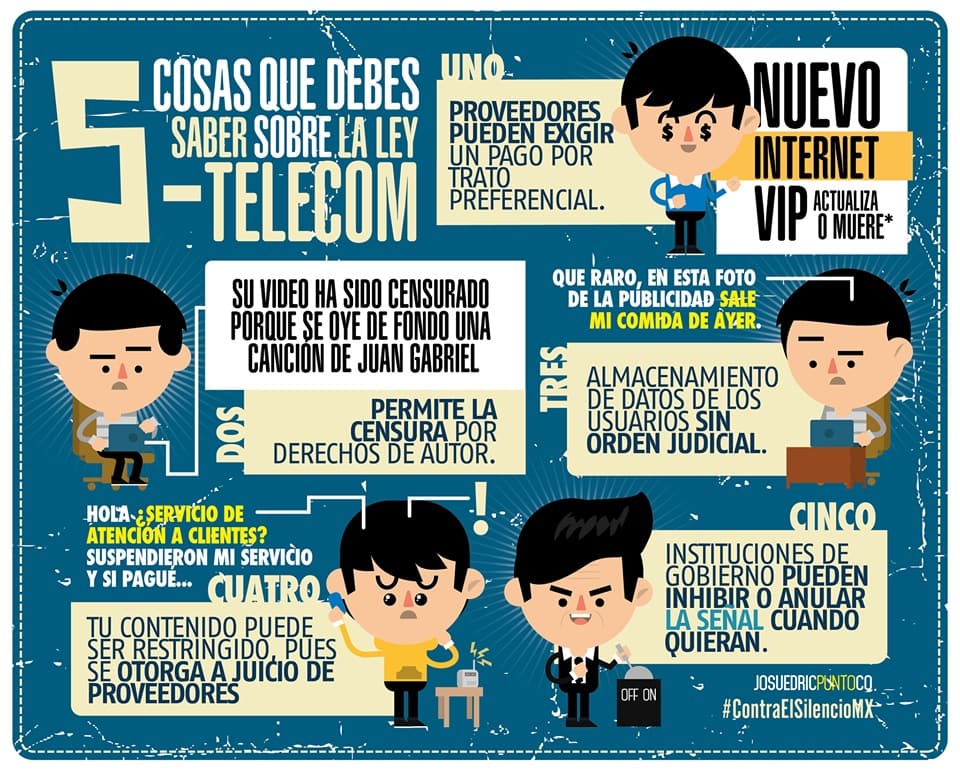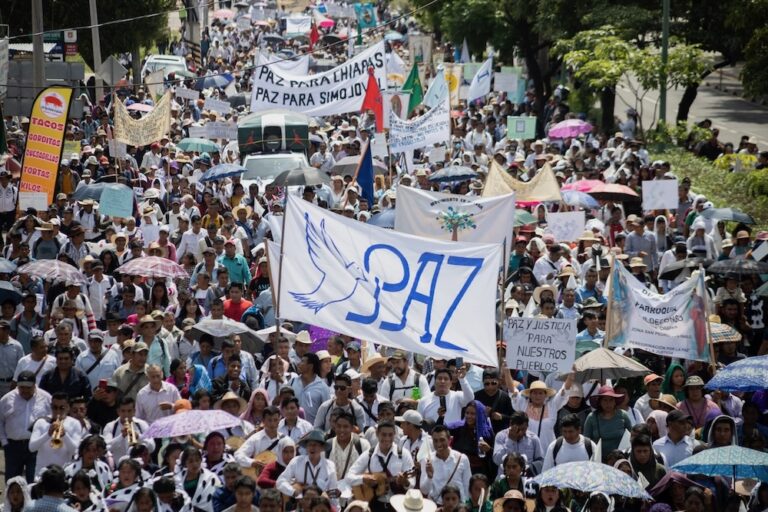Outraged by a new communications law, Mexicans showed how much their rights mean to them.
The Mexican government is in the process of bringing its communications laws in line with the reality of the digital age. It says that the proposed Ley de Telecomunicaciones y Radiodifusión, the telecommunications and broadcasting law that President Enrique Peña Nieto introduced on 24 March 2014, is a much-needed supplement to existing laws and is “designed to restore the balance of power between the giants in the market and the small players”.
The truth is more complicated. The executive director of Mexican NGO Centro Nacional de Comunicación Social (Cencos), Omar Rábago, wrote in a blog post that the intention of Peña Nieto’s initiative appears to be for the government to “continue putting economic groups and interests ahead of its obligations and responsibilities to respect and guarantee fundamental rights”. It is a bill that would ignore net neutrality, require telecommunications companies to retain user communication data and, says the Electronic Frontier Foundation (EFF), it would completely ignore the public’s request for more accessible points of internet use.
If all this sounds familiar, it is because Mexico is the latest country in Latin America to introduce a new communications law, coming on the heels of reform in Argentina, Ecuador and Uruguay.
In some ways it is a slow-moving wave of change; governments are only now realising the power and potential of online expression, both as an outlet for their citizens’ criticism and as a source of invaluable data on their critics. It is, however, a wave that threatens to wipe out the freedom that so many have seized in places that have otherwise been notorious for shutting down dissent.
During a 8 May visit to the Mexican Senate, the UN Special Rapporteur on Freedom of Opinion and Expression, Frank La Rue, recommended that senators should take the time to consult with other countries, like Brazil and Uruguay, on the process of introducing this type of new law. He noted that listening to people’s opinions should be prioritised in the process.
Over the last couple of months, many organisations, including IFEX members ARTICLE 19, Cencos, EFF, and Reporters Without Borders (RSF), have expressed their concerns with the bill, but it appears that their pleas are falling on deaf ears.
Widespread protests and actions against the bill have sprung up on the streets in Mexico. On 26 April police broke up a human chain in Mexico City before it was able to link the president’s residence to the offices of Televisa, the second largest media conglomerate in Latin America, a distance of 7 km.
Mexicanos en Helsinki, Finlandia, se unen simbólicamente a la #CadenaHumana para #DefenderInternet pic.twitter.com/wBl9n1Eshi vía @ContingenteMX
— Jacobo Nájera (@jacobonajera) May 6, 2014
(Mexicans in Helsinki, Finland, join on symbolically to the human chain to defend the Internet)
Online demonstrators have also been very active, creating a slew of hashtags about the bill: #LeyTelecom, #DefenderInternet, #ContraElSilencioMX, #NoMásPoderAlPoder and #EPNvsInternet, which refers to the president (Enrique Peña Nieto) and his perceived actions against the Internet. Online campaigns have also been created, such as #InternetLibreMX, which is a citizen initiative working to defend human rights online, and 1111mex.org which highlights 11 problems with the law and 11 ways to take action.
Hace un mes EPN le declaró la guerra al Internet.
Hoy, un día antes del #DiadeInternet, hacen un festejo. #EPNvsInternet: la amenaza sigue.
— OnceOnce (@1111mx) May 16, 2014
(It has been a month since EPN declared war on the Internet. Today, a day before the Day of the Internet there is a party. #EPNvsInternet: the threat continues)
In mid-April violent protests in Mexico City led to the ruling Institutional Revolutionary Party (PRI) taking a step back on the proposed legislation. On 22 April they removed a stipulation that would have forced telecom companies to supply the geographical location of their users if requested by intelligence services. It was a small victory for protestors, but there remain many more controversial stipulations in the bill. Keep reading to learn about the threats posed by the Ley de Telecomunicaciones y Radiodifusión:
Privacy
According to EFF, telecom companies will be required to keep user data for up to 12 months, compromising the online anonymity necessary for whistleblowers and journalists, and the general privacy of all Internet users.
Net neutrality
The idea of net neutrality − that all information online should be treated the same regardless of content, and that all people, from anywhere in the world, can access all kinds of content, at any time, via the Internet − would be threatened under the new law. Telecom companies would be allowed to offer services of varying speeds and qualities, which could create a tiered system forcing people to pay more to access certain types of information or sites. According to ARTICLE 19, this would go against the Mexican constitution, the American Convention on Human Rights and the International Covenant on Civil and Political Rights.
Protests and Freedom of Expression
The Joint Declaration on Freedom of Expression and the Internet, by the free expression rapporteurs of the UN, OAS, OSCE and ACHR, states that “Cutting off access to the Internet, or parts of the Internet, for whole populations or segments of the public…can never be justified, including on public order or national security grounds.” The Ley Telecom would do just that, allowing for Internet service to be cut in specific areas during times of political unrest “for reasons of public and national safety, at the request of relevant authorities”. This part of the law would not only allow communications to be censored if they are deemed a threat to public order, it would also stop people from organising demonstrations via the various networks. In February, Internet access was reportedly shut off in at least one specific region of Venezuela during widespread protests in that country.
The next phase of debate on the bill is slated for June.



